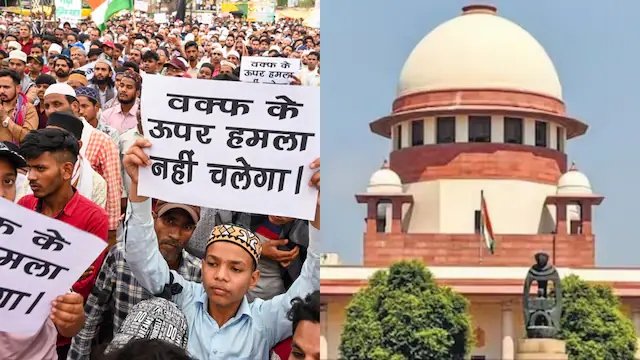A record total of around 70 petitions concerning the Waqf Amendment Law have been filed in the Supreme Court of India on Wednesday, as almost all major opposition parties challenge the new legislation in the highest court. However, the government is assured that the Supreme Court will not invalidate the law.
Asaduddin Owaisi was the first one to submit a petition
AIMIM chief Asaduddin Owaisi was the first person to submit a petition challenging the law in the Supreme Court, shortly after the President enacted the legislation. Amanatullah Khan, the Aam Aadmi Party MLA representing Okhla, has submitted a petition as well.
Additional petitioners consist of the Civil Rights Protection Association, Arshad Madani from the Jamiat Ulama-e-Hind, Imran Masood and Udit Raj representing the Congress party, RJD’s Manoj Kumar Jha, TMC’s Mahua Moitra, the Indian Union Muslim League, the Communist Party of India, CPI (Marxist)’s Mohammad Salim, Shia cleric Syed Kalbe Jawad Naqvi, and Anjuman-E-Islam. Vishnu Shankar Jain has additionally approached the SC.
ALSO READ: From Fetters and Chains to Cash and Tickets: Trump’s New Immigration Strategy
SC would not comment on new Waqf law, believes Kiren Rijiju
Union Minority Affairs Minister Kiren Rijiju expressed confidence that the Supreme Court will refrain from commenting on a legislative issue such as the new Waqf law. He also mentioned that the legislature and judiciary must honor one another. Addressing people in Haryana two days prior, Prime Minister Narendra Modi articulated a robust justification for the new law, stating that Waqf Law represents “true social justice.”
‘New law will respect the sacred essence of Waqf’: Modi
Modi stated that the new law will respect the sacred essence of Waqf, ensuring that the rights of poor and Pasmanda families in the Muslim community, along with Muslim women, particularly widows, and Muslim children, are safeguarded and respected in the future.
“This is what Babasaheb Ambedkar has given us: the duty to act in accordance with the spirit of the Constitution. This embodies genuine spirit; this represents true social justice,” Modi stated. He claimed that the 2013 law enacted by UPA only aided a select few land mafias, and the properties of Dalits, backward classes, tribals, and widows was looted.
“With the amendment to the Waqf law, the exploitation of the impoverished will stop. The crucial aspect is that we have accomplished a highly responsible and significant task. We have established an additional clause in this Waqf legislation. Now, according to the new regulation and the Waqf law, this Waqf Board will not have the authority to interfere with any tribal’s land, home, or property anywhere in India,” Modi stated, mentioning that the 2013 modifications by the UPA had prioritized the old law over the Constitution of India.














